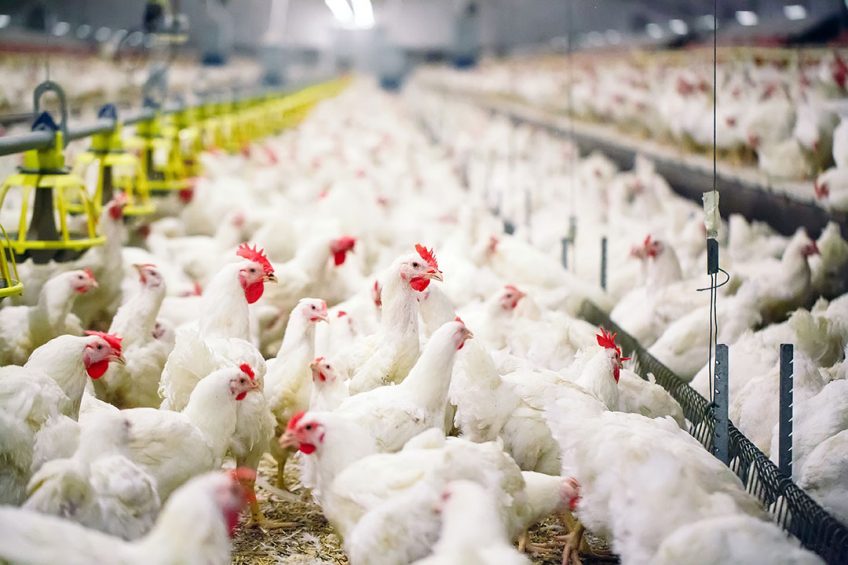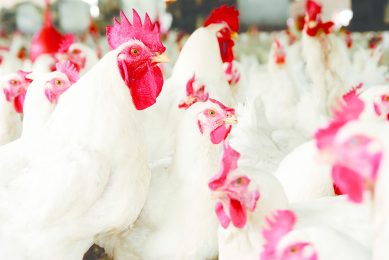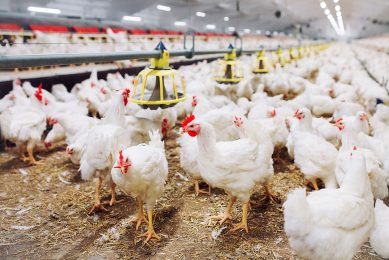Intestinal inflammation, a growing trend

As a poultry producer, intestinal inflammation is a health condition you should understand. It may be having a negative impact on the productivity of your poultry operation without you even realising it.
Intestinal inflammation is a condition that causes a roughness in a bird’s gastrointestinal tract, impairing its ability to absorb nutrients and achieve its growth and genetic potential. Intestinal inflammation can occur from infection, trauma, fighting, pecking and other environmental factors. But one of the main causes could be the bird’s diet as some feed ingredients, such as soybean meal, can cause an intestinal disturbance, which can lead to inflammation. In the past, poultry producers may have relied on antibiotics to compensate for potential health, facility and overall management issues. With restrictions on the use of antibiotics, health conditions such as intestinal inflammation will become more of an issue in the operation.
Inflammation causes leaky gut
The lining of the intestinal tract is comprised of a layer of epithelial cells. These cells are bound to each other by complex protein structures called “tight junctions,” and their role is to prevent bacteria, pathogens and toxins from passing through the intestinal lining and into the bloodstream.
Factors, such as heat stress, bacteria, feed contaminants, etc., can weaken the quality of the tight junctions, leading to a syndrome called “leaky gut.” This negative impact — leaky gut — allows molecules such as bacteria, pathogens and their toxins to pass in between the epithelial cells, resulting in cell damage or inflammation of the intestine. This inflammation will trigger the immune system to consume significant levels of nutrients to deal with the inflammation, reducing the amount of nutrients available for muscle growth.
Identifying intestinal inflammation
There are some visual indicators of intestinal inflammation: loose droppings, deteriorated litter quality, rough feathers, dirty feathers under the tail, reduced feed intake which results in slower growth rate and increased feed conversion rate. The litter will change from dry and block to moist and greasy, indicating the bird’s digestive system is not absorbing nutrients.
Performance trace minerals key
Various research studies have shown that the weakening of the tight junctions in the gut becomes more serious when a zinc deficiency is present. Zinc is important for the formation of structural components of organs, tissues, molecules and epithelial cells present in the intestine. Trace minerals, such as zinc, are one of those key nutrients that have been proven to boost the immune system. Compared to energy or amino acids, the demands of the immune response are higher for trace minerals than they are for virtually all the other nutrients. And the reason for this is that they are cofactors for a lot of the enzymes and protective proteins that are produced by the immune system.
In the past, poultry producers could utilise antibiotics to help fight bacteria, pathogen and derived toxins challenges. But in many other cases, the antibiotics may have been masking other important causes of intestinal inflammation.
Zinpro Corporation funded research with Ghent University located in Belgium, in collaboration with ILVO Animal Science, to investigate the effect of Availa-Zn® on broiler intestinal health and production performance when dysbiosis — a microbial imbalance — was induced in the gastrointestinal tract through nutrition. The study involved 680 male broilers with dysbiosis. Of those, 340 received a treatment of 60 ppm of zinc sulphate, and the other 340 birds receiving a treatment of 60 ppm zinc from Availa-Zn from hatching up to 36 days of age. The birds were challenged with a higher rate of inclusion of rough raw materials, such as rye with no addition of non-starch polysaccharide (NSP) enzymes, naturally inducing the dysbiosis.
The research showed that feeding zinc from Availa-Zn had a significant positive impact on zinc digestibility, oxidative status and preserving intestinal structure. Plus, at 28 days of age, the Availa-Zn treatment had a feed conversion ratio advantage. By including zinc from Availa-Zn in the poultry diet, producers can help to mitigate the effect of intestinal inflammation and oxidative stress in broiler chickens. This results in a lower mortality rate, increased intestinal integrity and a more robust immune response to the bacteria, pathogen or toxin challenge, allowing birds to achieve improved animal performance results.
 To learn more about intestinal inflammation go to EssentialFeed.zinpro.com. The site provides additional insights into inflammation and its link to common production challenges, as well as research summaries demonstrating the role performance trace minerals play in the management of inflammation. To learn more about intestinal inflammation go to EssentialFeed.zinpro.com. The site provides additional insights into inflammation and its link to common production challenges, as well as research summaries demonstrating the role performance trace minerals play in the management of inflammation. |
Author: By Leonardo Linares, Zinpro
Join 31,000+ subscribers
Subscribe to our newsletter to stay updated about all the need-to-know content in the poultry sector, three times a week. Beheer
Beheer




 WP Admin
WP Admin  Bewerk bericht
Bewerk bericht